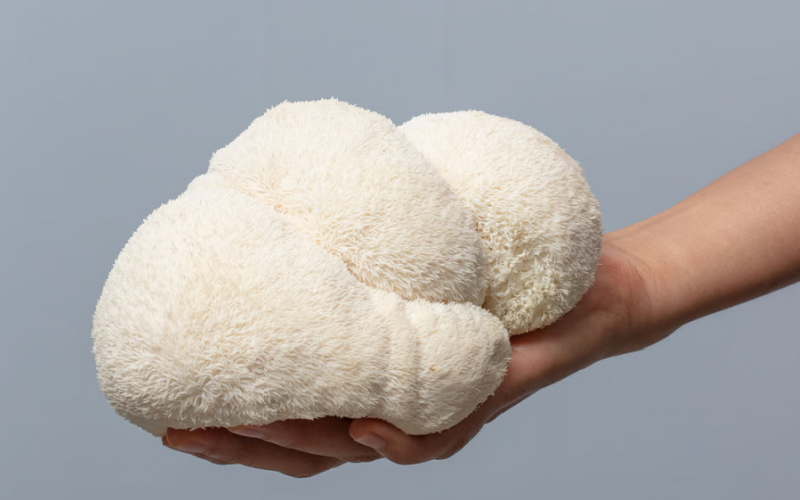
In the quest for cognitive enhancement and memory support, nature often holds the most potent secrets. Among these, Lion’s Mane mushroom emerges as a remarkable natural nootropic, revered for centuries yet only now gaining the recognition it deserves in the realm of brain health. This fascinating fungus, scientifically known as Hericium erinaceus, is not only a culinary delight but also a treasure trove of benefits for the human brain – particularly when it comes to memory enhancement.
Contents
Understanding Lion’s Mane Mushroom
In our journey to understand Lion’s Mane mushroom’s impact on memory and cognitive health, it’s essential to start at the very beginning. Here we look into the origins, nature, and characteristics of Lion’s Mane, setting the foundation for appreciating its role as a natural nootropic.
Historical Use of Lion’s Mane Mushroom in Traditional Medicine
Long before Lion’s Mane mushroom gained popularity in the Western world, it had a storied history in Eastern medicine. For centuries, traditional healers in China, Japan, and other Asian countries have used Lion’s Mane for its medicinal properties. Revered for its ability to enhance brain function and promote overall health and longevity, this mushroom was often reserved for royalty and esteemed scholars. These ancient practices, rooted in a deep understanding of natural remedies, underscore the enduring significance of Lion’s Mane in health and wellness.
Scientific Name and Description of Lion’s Mane
Known scientifically as Hericium erinaceus, Lion’s Mane is easily identifiable by its unique appearance. Resembling a white, shaggy mane of a lion, this mushroom grows in cascading, icicle-like spines rather than the typical cap-and-stem structure of most mushrooms. Found primarily on hardwood trees in temperate forests of North America, Europe, and Asia, Lion’s Mane thrives in a specific ecological niche, which contributes to its unique properties. The mushroom’s distinctive morphology is not just an aesthetic marvel but also an indicator of its rich bioactive compound profile.
Growth and Harvesting Conditions of Lion’s Mane
The growth and harvesting of Lion’s Mane are as fascinating as the mushroom itself. Preferring decaying hardwoods, particularly beech trees, Lion’s Mane grows in the wild mainly in the late summer and fall. However, with growing interest, it is now cultivated globally. The cultivation process, often involving sawdust or grain substrates, has been refined to maximize the yield and potency of the mushrooms. Understanding these conditions is crucial, as they directly impact the concentration of bioactive compounds that contribute to the mushroom’s nootropic effects.

Scientific Research on Lion’s Mane
As we get into the scientific exploration of Lion’s Mane mushroom, it’s crucial to understand the robust body of research that backs its use as a cognitive enhancer.
Key Lion’s Mane Studies on Memory and Cognition
The cognitive-enhancing effects of Lion’s Mane have been the subject of numerous scientific studies. Notably, a 2009 study published in “Phytotherapy Research” demonstrated that Lion’s Mane effectively improved memory and cognitive functions in a group of adults diagnosed with mild cognitive impairment [1].
Another significant study, published in the “Journal of Agricultural and Food Chemistry” in 2011, found that the mushroom’s extracts could stimulate nerve growth factor (NGF) synthesis, a vital component in brain health. These studies, among others, provide compelling evidence of Lion’s Mane’s potential as a natural nootropic, specifically in memory enhancement and cognitive support.
Bioactive Compounds in Lion’s Mane
The secret behind Lion’s Mane’s remarkable cognitive benefits lies in its rich array of bioactive compounds. Two groups of compounds, hericenones and erinacines, are particularly noteworthy. Found in the mushroom’s fruiting body and mycelium, respectively, these compounds have been shown to stimulate the production of NGF, which plays a crucial role in the growth, maintenance, and survival of neurons. This NGF-stimulating property of Lion’s Mane is a cornerstone of its neurotrophic benefits, setting it apart from other natural nootropics [2].
Lion’s Mane Mechanisms of Action on the Brain
Understanding the mechanisms through which Lion’s Mane exerts its effects on the brain is essential for comprehending its full potential. The mushroom’s ability to enhance neurogenesis – the growth of new neurons – and its neuroprotective properties are key. By promoting neurogenesis, Lion’s Mane supports brain plasticity, which is vital for learning and memory.
Additionally, its anti-inflammatory and antioxidant properties help protect neural cells from damage, contributing to overall brain health and cognitive function. These mechanisms, backed by scientific research, affirm Lion’s Mane’s status as a powerful tool in cognitive enhancement and neuroprotection.
Lion’s Mane and Memory Enhancement
The connection between Lion’s Mane mushroom and memory enhancement is not only fascinating but also backed by scientific evidence. This section delves into how Lion’s Mane specifically aids in improving memory, both in short-term and long-term capacities, and brings forward real-life case studies and personal experiences to illustrate these effects.
Lion’s Mane Effects on Neurogenesis
A key aspect of Lion’s Mane’s impact on memory enhancement is its influence on neurogenesis, the process of creating new neurons in the brain. Research has shown that compounds in Lion’s Mane, particularly hericenones and erinacines, stimulate the production of nerve growth factors. This stimulation aids in the development and functioning of neurons, which is essential for memory formation and retrieval. By fostering a conducive environment for neural growth and connectivity, Lion’s Mane can significantly improve neural plasticity, leading to better learning and memory capabilities [3].
Lion’s Mane Improves Short-Term and Long-Term Memory
The impact of Lion’s Mane on memory is not limited to a single type; it encompasses both short-term and long-term memory enhancements. Studies have indicated that regular consumption of Lion’s Mane can lead to improvements in working memory, attention, and concentration, which are crucial for daily cognitive tasks.
Additionally, its role in enhancing long-term memory has implications for age-related cognitive decline, suggesting potential benefits for individuals experiencing mild memory issues or those looking to preserve their cognitive abilities as they age.
Case Studies and Personal Accounts Involving Lion’s Mane and Memory
Beyond clinical research, the efficacy of Lion’s Mane in memory enhancement is also reflected in numerous personal accounts and case studies. Individuals who have incorporated Lion’s Mane into their diet often report noticeable improvements in memory recall, mental clarity, and cognitive function.
These anecdotal evidences, while not as rigorously scientific as controlled studies, provide real-life testimonials of the mushroom’s benefits. They not only reinforce the findings from scientific research but also give a human perspective to the cognitive enhancements Lion’s Mane can offer [4].

Additional Health Benefits of Lion’s Mane Mushroom
While Lion’s Mane mushroom is renowned for its memory-enhancing properties, its benefits extend far beyond cognitive health. This section explores the myriad of other health advantages offered by Lion’s Mane, highlighting its multifaceted role in promoting overall well-being.
Neuroprotective Effects of Lion’s Mane
Apart from enhancing memory and cognitive function, Lion’s Mane has significant neuroprotective properties. These effects are largely attributed to its ability to reduce inflammation and oxidative stress in the brain, which are key contributors to neuronal damage.
Studies have suggested that Lion’s Mane can potentially slow the progression of neurodegenerative diseases like Alzheimer’s and Parkinson’s by protecting neurons from degeneration. This neuroprotective capacity not only contributes to better brain health but also to a reduced risk of developing age-related neurological disorders.
Impact of Lion’s Mane on Mood and Anxiety
The influence of Lion’s Mane on mental health, particularly mood and anxiety, is another area garnering attention. Emerging research indicates that the mushroom may help alleviate symptoms of depression and anxiety. The mechanisms are thought to be linked to its effects on brain-derived neurotrophic factor (BDNF), a protein that plays a crucial role in mood regulation. By improving BDNF levels, Lion’s Mane can contribute to better emotional well-being, making it a valuable natural supplement for those dealing with mood disorders [5].
Potential Benefits of Lion’s Mane Mushroom for Neurodegenerative Diseases
The potential of Lion’s Mane in combatting neurodegenerative diseases is a field of great interest. Its ability to stimulate nerve growth factor and promote neuronal regeneration suggests it could be beneficial in treating conditions like Alzheimer’s and Parkinson’s diseases.
Although research is still in its early stages, preliminary studies have shown promising results, indicating that Lion’s Mane could play a role in not only preventing but also potentially reversing some aspects of neurodegeneration. This possibility opens up new avenues for natural therapies in the realm of neurological health.
References
[1] Mushrooms Magnify Memory by Boosting Nerve Growth
[2] Lion’s Mane Mushrooms Improve Memory, Study Finds
[3] Hericium erinaceus Improves Recognition Memory and Induces Hippocampal and Cerebellar Neurogenesis
[4] Lion’s Mane Mushroom May Boost Brain Cell Growth and Memory
[5] Lion’s Mane Mushroom May Boost Memory by Enhancing Nerve Growth

